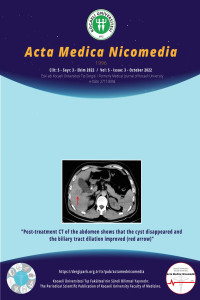Subakromiyal Sıkışma ve Nervus Suprascapularis Sıkışması Sendromları ile İlişkili Scapula Morfometrik Özellikleri
Öz
Amaç: Subakromiyal sıkışma ve nervus suprascapularis sıkışması sendromları ile ilişkili olabilen scapula morfometrik özelliklerini incelemek.
Gereç ve Yöntem: Anatomi Anabilim Dalı laboratuvarında bulunan, yaşı ve cinsiyeti belirsiz, toplam 71 adet scapula çalışmaya dahil edildi. Scapula’lar incisura scapulae şekline göre ve acromion alt yüzeyinin eğimi ve şekline göre tiplere ayrıldı. Buna ek olarak Incisura scapulae -tuberculum supraglenoidale, acromion-tuberculum supraglenoidale ve acromion- processus coracoideus arasındaki mesafe ölçüldü.
Bulgular: Incisura scapulae şekillerinden J tipi en fazla (%36,6) görülürken, en az oranda foramen tipine (%4,2) rastlandı. Acromion’lar alt yüzey eğimlerine göre sınıflandıklarında, en sık Tip I (düz) acromion (%69), acromion’lar şekillerine göre sınıflandırıldıklarında ise en sık tip 2 (kare) tipi (%38) saptandı. Incisura scapulae -tuberculum supraglenoidale arasındaki mesafe ortalama 31.97±3.08 mm, acromion-tuberculum supraglenoidale arasındaki mesafe ortalama 24,7±3,97 mm, acromion- processus coracoideus arasındaki mesafe ise ortalama 33,1±5,53 mm olarak bulundu. Bu mesafelerin incisura scapulae tiplerine göre değerlendirilmesinde ise istatistiksel olarak anlamlı bir sonuca rastlanmadı.
Sonuç: Scapula morfometrik özelliklerinin belirlenmesi klinikte subakromiyal sıkışma ve nervus suprascapularis sıkışması sendromlarına daha iyi ışık tutabilir.
Anahtar Kelimeler
Destekleyen Kurum
detekleyen kurum yoktur
Kaynakça
- 1.Zehetgruber H, Noske H, Lang T, Wurnig C. Suprascapular nerve entrapment. A meta-analysis. Int Orthop. 2002;26(6):339‐343.
- 2.Shanahan EM, Ahern M, Smith M, Wetherall M, Bresnihan B, FitzGerald O. Suprascapular nerve block (using bupivacaine and methylprednisolone acetate) in chronic shoulder pain. Ann Rheum Dis. 2003;62(5):400‐406.
- 3. Rengachary SS, Burr D, Lucas S, Hassanein KM, Mohn MP, Matzke H. Suprascapular entrapment neuropathy: a clinical, anatomical, and comparative study. Part 2: anatomical study. Neurosurgery. 1979;5(4):447‐451.
- 4.Natsis K, Totlis T, Tsikaras P, Appell HJ, Skandalakis P, Koebke J. Proposal for classification of the suprascapular notch: a study on 423 dried scapulas. Clin Anat. 2007;20(2):135‐139.
- 5. Thompson WA, Kopell HP. Peripheral entrapment neuropathies of the upper extremity. N Engl J Med. 1959;260(25):1261‐1265.
- 6.Neer CS 2nd. Anterior acromioplasty for the chronic impingement syndrome in the shoulder: a preliminary report. J Bone Joint Surg Am. 1972;54(1):41‐50.
- 7.Iqbal K, Iqbal R, Khan SG. Anatomical variations in shape of supracapular notch of scapula. J Morphol Sci. 2010;27:1-2.
- 8.Iqbal K, Iqbal R. Classification of suprascapular notch according to anatomical measurements in human scapulae. J Coll Physicians Surg Pak. 2011;21(3):169‐170.
- 9.Edelson JG, Taitz C. Anatomy of the coraco-acromial arch. Relation to degeneration of the acromion. J Bone Joint Surg Br. 1992;74(4):589-94.
- 10.Bigliani LH, Morrison DS, April EW. The morphology of the acromion and its relationship to rotator cuff tears. Orthop trans. 1986; 10:228.
- 11.Polguj M, Sibiński M, Grzegorzewski A, Grzelak P, Majos A, Topol M. Variation in morphology of suprascapular notch as a factor of suprascapular nerve entrapment. Int Orthop. 2013;37(11):2185‐2192.
- 12. Sabancıoğulları V, Koşar Mİ, Erdil FH, Çimen M, Acan K. Incisura skapula morfometrisi. CMJ. 2006;28(2):45-.49.
- 13.Patra A, Singh M, Kaur H. Variations in the shape and dimension of the suprascapular notch in dried human scapula-An osteological study with its clinical implications. IJARS. 2016;5(2):1-5.
- 14.Rengachary SS, Neff JP, Singer PA, Brackett CE. Suprascapular entrapment neuropathy: a clinical, anatomical, and comparative study. Part 1: clinical study. Neurosurgery. 1979;5(4):441‐446.
- 15.Edelson JG. Bony bridges and other variations of the suprascapular notch. J Bone Joint Surg Br. 1995;77(3):505‐506.
- 16.Ticker JB, Djurasovic M, Strauch RJ, et al. The incidence of ganglion cysts and other variations in anatomy along the course of the suprascapular nerve. J Shoulder Elbow Surg. 1998;7(5):472‐478.
- 17.Prescher A. Anatomical basics, variations, and degenerative changes of the shoulder joint and shoulder girdle. Eur J Radiol. 2000;35(2):88-102.
- 18.Bayramoglu A, Demiryürek D, Tüccar E, Erbil M, Aldur MM, Tetik O, Doral MN. Variations in anatomy at tha suprascapular notch possibly causing suprascapular nerve entrapment: an anatomical study. Knee Surg Sports Traumatol Artrosc. 2003;11(6):393-398.
- 19. Urguden M, Ozdemir H, Dönmez B, Bilbaşar H, Oğuz N. Is there any effect of suprascapular notch type in iatrogenic suprascapular nerve lesions? An anatomical study. Knee Surg Sports Traumatol Arthrosc. 2004;12(3):241‐245.
- 20.Boyan N, Ozsahin E, Kizilkanat E, Soames RW, Oguz O. Assessment of scapular morphometry. Int. J. Morphol. 2018;36(4):1305-1309.
- 21.Coskun N, Karaali K, Cevikol C, Demirel BM, Sindel M. Anatomical basics and variations of the scapula in Turkish adults. Saudi Med J. 2006;27:1320-1325.
- 22. Aktan A, Pala Ş, Taşkıran Ö, Öztürk L. Acromion tipleri ve uzunluk ortalamaları: Bunların dejeneratif değişikliklerle ilişkisi. Morfoloji dergisi. 1996; 4(1-2): 6-10.
- 23.Lawson JP. Clinically significant radiologic anatomic variations of the skeleton. Am J Roentgenol. 1994;163:249-255.
- 24.Sammarco VJ. Os acromiale:frequency, anatomy and clinical implications. J Bone Joint Surg Am. 2000;82:394-399. 25.Warner JJ, Beim GM, Higgins L. The treatment of symptomatic os acromiale. 1998;80:1320-1326.
- 26.Taşer FA, Başaloğlu H. Skapulanın morfometrik ölçümleri. Ege Tıp Dergisi. 2003;42(2):73-80.
- 27.De Mulder K, Marynissen H, Van Laere C, Lagae K, Declercq G. Arthroscopic transglenoid suture of Bankart lesions. Acta Orthop Belg. 1998;64(2):160‐166.
- 28. Von Schroeder HP, Kuiper SD, Botte MJ. Osseous anatomy of the skapula. Clin Orthop Relat Res. 2001;(383):131-139.
- 29. Mallon WJ, Brown HR, Vogler JB 3rd, Martinez S. Radiographic and geometric anatomy of the scapula. Clin Orthop Relat Res. 1992;(277):142‐154.
- 30.Ünal N, Özden H, Özçelik A, Akdoğan I, Günal İ. Subakromial aralık, akromion kalınlığı ilişkisi. Morfoloji Dergisi 1997; 5 (1-2):10-12.
- 31. Lingamdenne PE, Marapaka P. Measurement and analysis of anthropometric measurements of the human scapula in Telangana region, India. International Journal of Anatomy and Research. 2016;4:2677-83.
Ayrıntılar
| Birincil Dil | Türkçe |
|---|---|
| Konular | Klinik Tıp Bilimleri, Ortopedi, Anatomi, Rehabilitasyon |
| Bölüm | Araştırma Makaleleri |
| Yazarlar | |
| Yayımlanma Tarihi | 15 Ekim 2022 |
| Gönderilme Tarihi | 1 Eylül 2022 |
| Kabul Tarihi | 22 Eylül 2022 |
| Yayımlandığı Sayı | Yıl 2022 Cilt: 5 Sayı: 3 |
"Acta Medica Nicomedia" Tıp dergisinde https://dergipark.org.tr/tr/pub/actamednicomedia adresinden yayımlanan makaleler açık erişime sahip olup Creative Commons Atıf-AynıLisanslaPaylaş 4.0 Uluslararası Lisansı (CC BY SA 4.0) ile lisanslanmıştır.


